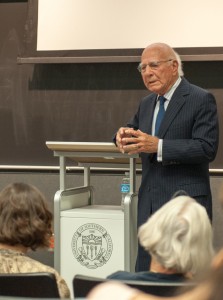Paul Ignatius lectures students on leadership
Paul R. Ignatius, the former Secretary of the Navy, gave a lecture on Tuesday entitled “Personal Leadership in Government & Business” to a group of students about the significance of personal leadership.

Igniting fire · USC alumnus and naval veteran Paul Ignatius discusses the notion of leadership to students Tuesday at Waite Phillips Hall. – William Ehart | Daily Trojan
Ignatius’s lecture, hosted by the USC Dornsife College of Letters, Arts and Sciences’ Department of Political Science, focused on using examples from past and present world events, as well as from his own experiences in order to instruct attendees on how to be effective, respectable leaders.
“The concept of leadership is more than a matter of giving orders and expecting an immediate response,” Ignatius said.
Throughout the lecture, Ignatius stressed the importance of patience, communication and interpersonal relationships in successful leadership.
After graduating from USC, Ignatius served as a World War II naval officer and earned an MBA from Harvard University. He was in active service for both the Kennedy and Johnson presidential administrations and worked for eight years as an Assistant Secretary of the Army before becoming Secretary of the Navy.
After his work in the government, he served as president of the Washington Post for two years and president of the Air Transportation Association for 15 years. He is also the author of On Board: My Life in the Navy, Government, and Business.
Ignatius urged students to try to understand the individuals that they are working with in order to lead more successfully. He said that by knowing the people in the situation, one is able to delegate certain responsibilities to certain individuals confidently and ensure that the individual will be able to get the job done.
“Don’t do everything yourself, delegate it to others,” Ignatius said. “Delegation is not abdication, rather, [delegation] implies reciprocity.”
Some students found Ignatius’s advice on delegation particularly eye-opening.
“I feel like there’s a notion these days that in order to be successful, you have to take on a leadership role and do everything yourself,” said Ivy Lam, a freshman majoring in business administration. “So it was really cool to hear someone as experienced and intelligent as [Ignatius] talk about the importance of making connections and delegating responsibilities as a way to be successful.”
Many attendees were in the class “Leadership in World Politics,” taught by Professor Richard Dekmejian. Anyone, however, was welcome to attend.
“I thought that his speech was particularly interesting because of all that he’s accomplished,” said Ashley Modell, an undecided freshman who sat in on the lecture. “His long list of accomplishments almost made what he was saying more believable and more valuable to me. I just sat in on his lecture, not a part of the class, and I felt that the information was still just as valuable to me.”
Ignatius also told attendees to view things from a less self-centered perspective.
“Try to see things as others see them, and not as you see them,” Ignatius said. “It is terribly important to view circumstances as someone else would view them, rather than as you do.”
To illustrate his point , Ignatius provided the example of the Vietnam War, pinpointing the reason for the failure on the United States’ tendency to only think of the Vietnamese army as a mirror of their own. He noted that the major escalation of the war came from the United States’ inability to fully comprehend the other side.
“It was really cool how [Ignatius] gave exact examples from American politics and related them back to the basic elements of how to be a good leader on a level that was easy for us students to relate to,” said Larke Nimocks, an undecided freshman.
Miranda Hearst, a freshman majoring in communication, also enjoyed Ignatius’s use of real world events to explain his points.
“It wasn’t like he was just feeding us tips and information without any substance to them,” Hearst said. “He was giving us real-world examples of how this information is actually useful and has been valuable in the past.”
Ignatius ended his lecture with a simple adage.
“Do the right thing,” he urged. “Even though it may be a hard choice.”
Follow us on Twitter @dailytrojan
